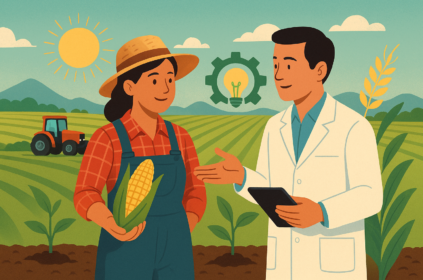Pakistan’s agricultural sector is at a crossroads, grappling with challenges like water scarcity, climate change, and low yields. Yet, these very obstacles make it a fertile ground for agri-tech innovation. Jawwad Hasan, CEO and co-founder of Agrilift, a leading precision farming solution, believes Pakistan’s unique challenges position it as an ideal testing ground for scalable, tech-driven agricultural solutions. In this article, we’ll explore how agri-tech in Pakistan is addressing critical issues, delivering transformative results, and paving the way for global applications.
The Agricultural Challenges Facing Pakistan
Pakistan’s agricultural sector, a backbone of its economy, faces a complex web of challenges that threaten food security and sustainability. These include:
- Water Scarcity: Over 80% of Pakistan’s farmland relies on irrigation, but water shortages are a growing concern due to climate change and mismanagement.
- Climate Shocks: Erratic weather patterns, including droughts and floods, disrupt planting and harvesting cycles.
- Fragmented Land Holdings: Small, scattered plots make it difficult to implement modern farming techniques.
- Low Yields: Factors like poor land preparation, low-quality seeds, and pest infestations result in suboptimal crop output.
- Reliance on Traditional Methods: Many farmers depend on guesswork, leading to inefficiencies and wasted resources.
Jawwad Hasan emphasizes that these challenges, while daunting, present an opportunity. “Pakistan faces nearly every agricultural challenge under the sun,” he says, “but this makes it the perfect proving ground to build robust, scalable solutions.” By addressing these issues locally, Pakistan can develop precision farming solutions that are adaptable to other developing nations, from Africa to the Americas.
Agrilift: Pioneering Precision Farming in Pakistan
What is Agrilift?
Agrilift, under Hasan’s leadership, is a deep-tech platform designed to transform farm data into actionable insights. Built on the 3R principle—delivering the Right insight at the Right time for the Right decision—Agrilift empowers farmers to optimize yields and profitability. Unlike many agri-tech solutions that focus solely on data collection, Agrilift bridges the gap between technology and on-ground implementation through dedicated agronomist support.
Key Features of Agrilift’s FarmLink Platform
Agrilift’s FarmLink platform, developed over three years with a problem-first, technology-agnostic approach, tackles challenges across the entire seed-to-harvest cycle. Its standout features include:
- Germination Reports: Provide early, accurate plant counts to optimize crop planning.
- Digital Scouting: Identifies weed hotspots, salinity issues, and irrigation gaps for timely interventions.
- Crop Health Monitoring: Offers early warnings about pests and diseases, enabling proactive control measures.
- Field Size Accuracy: Corrects misestimations of field sizes, reducing input waste and costs.
Hasan highlights a critical insight: “80% of farmers had misestimated field sizes, wasting millions in inputs. One farmer overestimated by 15 acres, incurring Rs10 million in extra costs.” By addressing such inefficiencies, Agrilift delivers measurable value to farmers.
Real-World Impact: Partnership with Fauji Fertilizer Company
Agrilift’s partnership with Fauji Fertilizer Company (FFC) marks Pakistan’s largest agri-tech deployment to date. In its first commercial crop cycle, Agrilift:
- Delivered over $3 million in additional value for more than 100 farmers.
- Reduced yield gaps by up to 15%.
- Conducted over 13,000 drone missions across 300,000 acres, mapping 40,000+ farm input events.
These results demonstrate the power of precision farming to transform agriculture at scale. By combining drone technology, data analytics, and on-ground support, Agrilift ensures that insights translate into actionable outcomes.
The Role of Data-Driven Decision-Making
Why Data is the Cornerstone of Agri-Tech
Hasan believes that the single most transformative change for Pakistan’s agricultural ecosystem would be institutionalizing data-driven decision-making. “Safeguarding farmer privacy while developing national standards for gathering, analyzing, and sharing farm data is critical,” he says. Accurate, real-time data can improve:
- Credit Evaluation: Enabling farmers to access financing based on reliable data.
- Climate Adaptation: Helping farmers respond to weather changes proactively.
- Subsidy Targeting: Ensuring resources reach the right farmers at the right time.
- Resource Allocation: Optimizing inputs like water, fertilizers, and seeds.
Without data, Hasan argues, “we’re operating in the dark, responding to issues after they become serious.” A unified, intelligence-driven system could unlock Pakistan’s agricultural potential and establish it as a global leader in agri-tech innovation.
Building a Data-Driven Ecosystem
To achieve this, Pakistan needs:
- Investment in R&D: Increased funding for agricultural research to develop innovative tools and techniques.
- Innovation-Friendly Policies: Regulations that encourage experimentation and reduce risks for startups.
- Public-Private Partnerships: Collaborations that combine government resources with private-sector expertise.
- Talent Acquisition: Attracting top data scientists, engineers, and agronomists to drive technological advancements.
By prioritizing these areas, Pakistan can create a robust framework for precision farming solutions that benefit farmers and the broader economy.
Addressing Global Challenges with Local Solutions
Pakistan’s agricultural challenges are not unique. Many developing nations face similar issues, from water scarcity to climate vulnerability. By solving these problems locally, Pakistan can export agri-tech solutions to regions like Africa and the Americas. Hasan notes, “If we can resolve these challenges here using tech-enabled, scalable models, we can export solutions worldwide.”
Agrilift’s success with FFC demonstrates the potential for global scalability. The platform’s ability to deliver measurable results in Pakistan’s diverse agricultural landscape suggests it can adapt to other contexts, addressing food security on a global scale.
Overcoming Barriers to Adoption
Bridging the Last-Mile Gap
One of the biggest challenges in agri-tech is ensuring that technology reaches farmers and is implemented effectively. Many solutions fail because they stop at providing reports, leaving farmers to interpret complex data on their own. Agrilift addresses this through:
- Problem-First Design: Built with farmers to address real-world challenges.
- Depth of Insights: Combines data on seeds, soil, weather, and inputs for proactive decision-making.
- Farmer Trust: Weekly agronomist visits turn data into simple, actionable steps.
This approach ensures that technology is not just a tool but a practical solution that farmers can adopt and trust.
Educating and Empowering Farmers
To accelerate adoption, Agrilift pairs its platform with on-ground support. Agronomists work closely with farmers, translating data into actionable insights that improve outcomes. This hands-on approach builds trust and demonstrates the value of technology, encouraging long-term adoption.
The Future of Agri-Tech in Pakistan
Scaling Innovation Nationally and Globally
Agrilift’s vision is to engage with every plant on the farm, enabling data-backed decisions across the entire seed-to-harvest cycle. The next step is embedding these capabilities into Pakistan’s food system and adapting the model for global markets. By leveraging public-private partnerships and investing in R&D, Pakistan can position itself as a leader in agri-tech innovation.
Policy Recommendations
To support this vision, policymakers should focus on:
- Data Infrastructure: Develop national standards for farm data collection and sharing.
- Incentives for Innovation: Offer grants and tax breaks for agri-tech startups.
- Farmer Education: Launch programs to train farmers on modern technologies.
- Global Collaboration: Partner with international organizations to share knowledge and resources.
Conclusion: A Bright Future for Pakistan’s Agri-Tech Sector
Pakistan’s agricultural challenges are significant, but they also present an opportunity to lead the global agri-tech revolution. Companies like Agrilift are proving that precision farming solutions can deliver tangible results, from higher yields to reduced costs. By investing in data-driven decision-making, fostering innovation, and building trust with farmers, Pakistan can secure its food future and export solutions worldwide.















